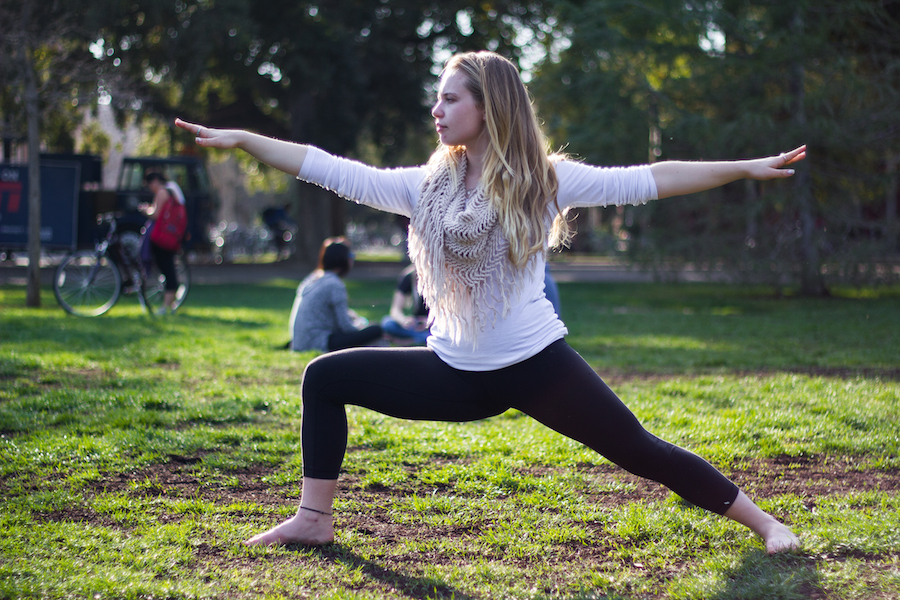
UC Davis Occupational Health Services seeks to improve wellbeing
Since the beginning of February, Occupational Health Services (OHS) has been focusing on UC Davis students’, staff members’ and faculties’ health and wellbeing through the new Mindfulness Meditation program. The sessions are led by Beth Cohen, a consulting psychologist and former director of the UC Davis Academic and Staff Assistance Program (ASAP). They are held in North Hall every Thursday from 10 a.m. to 11:20 a.m.
“Mindfulness meditation is designed to teach people to learn to focus on the moment rather than the past or future,” Cohen said. “Faculty and staff find it very powerful to meditate in a group and our groups include beginners as well as more advanced meditators. Not only do people report that they leave the class experiencing more relaxation, many notice positive changes in their lives when they meditate more often.”
Dr. Robert Belcourt, OHS medical director, hopes that the program will decrease on-the-job injuries for UC Davis employees.
“We’re often thought primarily as just treating workplace injuries, which we definitely do, but our goal is to really treat the injuries that come in appropriately and use those experiences to prevent future injuries,” Belcourt said.
To reduce injuries, OHS implemented a full-featured wellness program for faculty and staff on campus called Workstrong back in 2012. Since then, OHS started introducing subprograms such as Mindfulness Meditation. According to Belcourt, there has been ample research done on the beneficial effects of meditation on people’s brains.
“We have been getting more knowledge as to the effect of neurotransmitters on mood and mental health,” Belcourt said. “Diseases such as depression are from direct imbalances of neurotransmitters, but the interesting thing is that the level of neurotransmitters in the brain can be altered and restored to balance by non-pharmacologic methods, such as aerobic exercise and meditation.”
There is one necessity when it comes to changing the level of neurotransmitters during meditation: to stay in the moment.
“The most powerful part of meditation is breathing,” Cohen said. “Injuries sometimes occur when we are distracted, anxious or overwhelmed. Focusing on our breathing throughout the day allows the body to stay in a calmer state, even if we are experiencing stress at work, and activates those parts of our brain where we experience peace and happiness.”
Regular participation in meditation can lead to lower blood pressure, reduced anxiety and depression, and can play a role in helping with heart and immune system issues. According to Cohen, there is even research which shows meditation helps keep sobriety among substance abusers.
Since the Mindfulness Meditation program is new and upcoming, it is difficult to prove any causation between recent decreases in staff injuries and the sessions. However, Stacey Brezing, OCH special services program manager, said the amount of workplace injuries have been below expected statistics since the programs started.
“We measure every year with an actuary from the University of California, Office of the President (UCOP),” Brezing said. “They look at the people who have been through Workstrong and graduated and their expected number of injuries that they would have subsequent. If we are below that, then the program is working, and we have been for the last two years.”
220 people enrolled and about 150 showed up to the first Mindfulness Meditation class. According to Cohen, meditation has gained support due to the variety of healthy practices it involves.
“There are other ways to be meditative as well — you don’t need to only sit and be still,” Cohen said. “You can do movement meditation like yoga, martial arts and tai chi. People can experience meditative value in almost any activity if they slow down, focus on their breathing and stay in the moment during the activity. Meditation is about learning to observe our thoughts rather than continuously reacting to them.”
According to Brezing, many workplaces have still not acknowledged the health and work benefits of meditation. She hopes that changing the work environment at UC Davis will aid in starting a larger cultural change.
“Creating a healthy environment can be anything from healthy vending machines to a different mindset for managers and supervisors to focus more on their staff’s health and wellness and allowing them to take needed breaks,” Brezing said. “It would be great if we allowed release time for exercising during work because that’s a barrier for a lot of people.”
OHS hopes that over time, these sessions will help UC Davis employees through any hardships by attempting to change the way the brain reacts to those changes.
“In my classes I say, ‘If a thought comes into your mind, go back to your breath,’” Cohen said. “Meditation creates a feeling of wellbeing that I want everyone to have. It doesn’t mean you don’t have problems, but it builds resilience and gives us more resources to make it through those tough times.”
Written by: Lisa Wong – features@theaggie.org









